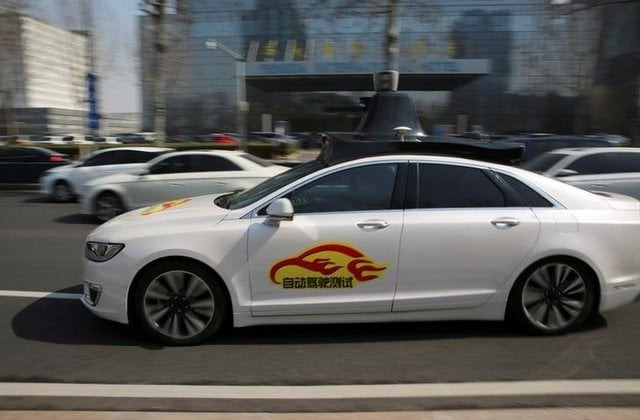China gives Baidu go-ahead for self-driving tests after US crash
The accident Arizona was the first death attributed to a self-driving car operating in autonomous mode

Baidu's Apollo autonomous cars are seen during a public road test for self-driving vehicles in Beijing, China March 22, 2018.
PHOTO: REUTERS
Beijing’s move is an important step as China looks to bolster its position in the global race for autonomous vehicles, where regulatory concerns have come into the spotlight since the crash earlier this month.
The accident in Tempe, Arizona, involving an Uber self-driving car, was the first death attributed to a self-driving car operating in autonomous mode and has ramped up pressure on the industry to prove its software and sensors are safe.
Self-driving cars with "remote" drivers could test on Calif roads in April
Beijing has given Baidu, best known as China’s version of search engine Google, a permit to test its autonomous vehicles on 33 roads spanning around 105 kilometers (65 miles) in the city’s less-populated suburbs, the firm said in a statement.
Baidu is leading China’s push in driverless technology, with Beijing keen to keep up with global rivals such as Waymo, the self-driving arm of Google parent Alphabet and Tesla. It has a major self-driving project called Apollo.
“With supportive policies, we believe that Beijing will become a rising hub for the autonomous driving industry,” Baidu Vice-President Zhao Cheng said in the statement.
Two people close to DiDi Chuxing, China’s dominant ride-hailing company which is also working on self-driving, said earlier this week firms developing autonomous vehicles were not likely to slow down plans for testing and developing
“I am quite positive on the potential of the technology because autonomous technology makes vehicles far less prone to accidents than human drivers,” one of the people said.
Didi declined to comment.
Arizona police release video of fatal collision with Uber self-driving SUV
Earlier this month China issued licenses to automakers allowing self-driving vehicles to be road tested in Shanghai, which included Shanghai-based SAIC and electric vehicle start-up NIO.
Regulations in the sector are, however, still catching up with fast growth and increasing numbers of firms wanting to carry out tests on public roads.
Baidu Chief Executive Robin Li tested his firm’s driverless car on Beijing’s roads last July, stirring controversy as there were no rules for such a test at the time. The firm hopes to get self-driving cars onto the roads in China by 2019.
Baidu said that before conducting tests on public roads, autonomous vehicles using its Apollo system would go through simulation tests as well as trials on closed courses.



















COMMENTS
Comments are moderated and generally will be posted if they are on-topic and not abusive.
For more information, please see our Comments FAQ